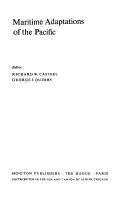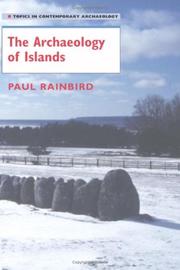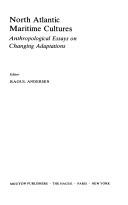| Listing 1 - 10 of 16 | << page >> |
Sort by
|


ISBN: 3110879905 9783110879902 0202011410 9780202011417 9027976198 9789027976192 Year: 2011 Publisher: Berlin Boston
Abstract | Keywords | Export | Availability | Bookmark
 Loading...
Loading...Choose an application
- Reference Manager
- EndNote
- RefWorks (Direct export to RefWorks)
No detailed description available for "Maritime Adaptations of the Pacific".
Maritime anthropology --- Ethnology --- Cultural anthropology --- Ethnography --- Races of man --- Social anthropology --- Anthropology --- Human beings --- Marine anthropology --- Marine ethnology --- Maritime ethnology

ISBN: 9780521853743 0521853745 0521619610 9780521619615 9780511619007 9780511290572 0511290578 0511287380 9780511287381 0511289979 9780511289972 9780511289385 0511289383 0511619006 1107176530 9781107176539 1280917385 9781280917387 9786610917389 6610917388 0511288700 9780511288708 0511301898 9780511301896 Year: 2007 Volume: *3 Publisher: Cambridge [etc.] Cambridge University Press
Abstract | Keywords | Export | Availability | Bookmark
 Loading...
Loading...Choose an application
- Reference Manager
- EndNote
- RefWorks (Direct export to RefWorks)
Archaeologists have traditionally considered islands as distinct physical and social entities. In this book, Paul Rainbird discusses the historical construction of this characterization and questions the basis for such an understanding of island archaeology. Through a series of case studies of prehistoric archaeology in the Mediterranean, Pacific, Baltic, and Atlantic seas and oceans, he argues for a decentering of the land in favor of an emphasis on the archaeology of the sea and, ultimately, a new perspective on the making of maritime communities. The archaeology of islands is thus unshackled from approaches that highlight boundedness and isolation, and replaced with a new set of principles - that boundaries are fuzzy, islanders are distinctive in their expectation of contacts with people from over the seas, and that island life can tell us much about maritime communities. Debating islands, thus, brings to the fore issues of identity and community and a concern with Western construction of other peoples.
Island archaeology. --- Islands. --- Maritime anthropology. --- Island archaeology --- Islands --- Maritime anthropology --- Marine anthropology --- Marine ethnology --- Maritime ethnology --- Isles --- Islets --- Anthropology --- Ethnology --- Landforms --- Archaeology --- Social Sciences --- Archeology

ISBN: 9027978301 9783110808827 311080882X 9789027978301 0202900797 9780202900797 Year: 1979 Publisher: The Hague: Mouton,
Abstract | Keywords | Export | Availability | Bookmark
 Loading...
Loading...Choose an application
- Reference Manager
- EndNote
- RefWorks (Direct export to RefWorks)
No detailed description available for "North Atlantic Maritime Cultures".
Maritime anthropology --- Ethnology --- Marine anthropology --- Marine ethnology --- Maritime ethnology --- Anthropology --- Cultural anthropology --- Ethnography --- Races of man --- Social anthropology --- Human beings --- Congresses --- Ethnology - North Atlantic Region
Book
ISBN: 1760462179 1760462160 Year: 2018 Publisher: ANU Press
Abstract | Keywords | Export | Availability | Bookmark
 Loading...
Loading...Choose an application
- Reference Manager
- EndNote
- RefWorks (Direct export to RefWorks)
"Anthropologists have written a great deal about the coastal adaptations and seafaring traditions of Pacific Islanders, but have had much less to say about the significance of rivers for Pacific island culture, livelihood and identity. The authors of this collection seek to fill that gap in the ethnographic record by drawing attention to the deep historical attachments of island communities to rivers, and the ways in which those attachments are changing in response to various forms of economic development and social change. In addition to making a unique contribution to Pacific island ethnography, the authors of this volume speak to a global set of issues of immense importance to a world in which water scarcity, conflict, pollution and the degradation of riparian environments afflict growing numbers of people. Several authors take a political ecology approach to their topic, but the emphasis here is less on hydro-politics than on the cultural meaning of rivers to the communities we describe. How has the cultural significance of rivers shifted as a result of colonisation, development and nation-building? How do people whose identities are fundamentally rooted in their relationship to a particular river renegotiate that relationship when the river is dammed to generate hydro-power or polluted by mining activities? How do blockages in the flow of rivers and underground springs interrupt the intergenerational transmission of local ecological knowledge and hence the ability of local communities to construct collective identities rooted in a sense of place?"
Maritime anthropology --- Rivers --- Water --- Crocodiles --- Ethnology. --- Religious aspects. --- Brooks --- Creeks --- Runs (Rivers) --- Streams --- Bodies of water --- Marine anthropology --- Marine ethnology --- Maritime ethnology --- Anthropology --- Ethnology --- Crocodiles (in religion, folk-lore, etc.) --- Water (in religion, folk-lore, etc.) --- Pacific Islands --- Waikato River
Book
ISBN: 9789811911187 Year: 2022 Publisher: Singapore Springer Nature Singapore :Imprint: Springer
Abstract | Keywords | Export | Availability | Bookmark
 Loading...
Loading...Choose an application
- Reference Manager
- EndNote
- RefWorks (Direct export to RefWorks)
Paleogeography. --- Prehistoric peoples. --- Maritime anthropology. --- Marine anthropology --- Marine ethnology --- Maritime ethnology --- Anthropology --- Ethnology --- Cavemen (Prehistoric peoples) --- Early man --- Man, Prehistoric --- Prehistoric archaeology --- Prehistoric human beings --- Prehistoric humans --- Prehistory --- Primitive societies --- Human beings --- Antiquities, Prehistoric --- Palaeogeography --- Physical geography
Book
ISBN: 9811911177 9811911185 Year: 2022 Publisher: Gateway East, Singapore : Springer,
Abstract | Keywords | Export | Availability | Bookmark
 Loading...
Loading...Choose an application
- Reference Manager
- EndNote
- RefWorks (Direct export to RefWorks)
Paleogeography. --- Prehistoric peoples. --- Maritime anthropology. --- Marine anthropology --- Marine ethnology --- Maritime ethnology --- Anthropology --- Ethnology --- Cavemen (Prehistoric peoples) --- Early man --- Man, Prehistoric --- Prehistoric archaeology --- Prehistoric human beings --- Prehistoric humans --- Prehistory --- Primitive societies --- Human beings --- Antiquities, Prehistoric --- Palaeogeography --- Physical geography
Periodical
ISSN: 22129790 18727859 Year: 2002 Publisher: Amsterdam SISWO
Abstract | Keywords | Export | Availability | Bookmark
 Loading...
Loading...Choose an application
- Reference Manager
- EndNote
- RefWorks (Direct export to RefWorks)
Fisheries --- Marine sciences --- Pêches --- Sciences de la mer --- Research --- Periodicals. --- Recherche --- Périodiques --- Maritime anthropology --- Marine sciences. --- Research. --- Ocean sciences --- Fishery management --- Fishery research --- Fishes --- Sport fishery research --- Marine anthropology --- Marine ethnology --- Maritime ethnology --- Coastal fisheries --- Commercial fisheries --- Commercial fishing industry --- Farms, Fish --- Fish farms --- Fishery industry --- Fishery methods --- Fishing industry --- Freshwater fisheries --- Inland fisheries --- Large-scale fisheries --- Marine fisheries --- Marine recreational fisheries --- Recreational fisheries --- Sea fisheries --- Sea fishing industry --- Sport fisheries --- Conservation --- Aquatic sciences --- Anthropology --- Ethnology --- Aquaculture --- Wildlife utilization --- Fishery sciences
Book
ISBN: 1461481775 1493902032 1461481783 Year: 2014 Publisher: New York, NY : Springer New York : Imprint: Springer,
Abstract | Keywords | Export | Availability | Bookmark
 Loading...
Loading...Choose an application
- Reference Manager
- EndNote
- RefWorks (Direct export to RefWorks)
In creating interpretive strategies for maritime sites, archaeologists and resource managers often are required to think creatively to overcome challenges and problems. These issues include interpreting sites in inaccessible locations and extremely deep water, enabling and controlling access to fragile sites and restricted areas, monitoring visitor behavior, making information interesting to a wide audience, and creating opportunities for public engagement, among other concerns. Meeting Challenges presents cutting-edge interpretation and public education strategies for maritime resources, both on land and underwater, with emphasis on solving the unique problems often associated with presenting these fragile, limited-access sites as heritage attractions and on developing effective visitation and civic engagement opportunities. The examples presented ideally can serve as models for resource managers, archaeologists engaged in interpretation, and site administrators. This volume brings together a diverse group of heritage professionals to discuss issues they’ve encountered and to present ideas and case studies for adapting, improvising, and overcoming them.
Maritime anthropology. --- Underwater archaeology. --- Archaeology, Submarine --- Marine archaeology --- Maritime archaeology --- Nautical archaeology --- Submarine archaeology --- Marine anthropology --- Marine ethnology --- Maritime ethnology --- Social sciences. --- Cultural heritage. --- Archaeology. --- Social Sciences. --- Cultural Heritage. --- Archaeology --- Underwater exploration --- Marine archaeologists --- Anthropology --- Ethnology --- Cultural heritage --- Cultural patrimony --- Cultural resources --- Heritage property --- National heritage --- National patrimony --- National treasure --- Patrimony, Cultural --- Treasure, National --- Property --- World Heritage areas --- Archeology --- Auxiliary sciences of history --- History --- Antiquities --- Cultural property.
Book
ISBN: 2854300742 2854300114 Year: 2008 Publisher: Paris Société des Océanistes
Abstract | Keywords | Export | Availability | Bookmark
 Loading...
Loading...Choose an application
- Reference Manager
- EndNote
- RefWorks (Direct export to RefWorks)
Si, en Nouvelle-Calédonie, exemple type d’une civilisation de l’igname, les Kanak assuraient leur autosubsistance essentiellement par l’horticulture des plantes à tubercules, la pêche n’y jouait pas moins un rôle important. Activité presque exclusivement masculine, elle était surtout le fait de certains groupes de parenté, les clans dits pêcheurs, qui pratiquaient généralement ensemble cette activité coutumière pour nourrir la population et assurer les échanges coutumiers, même si une autre pêche, plus individuelle et d’autosubsistance, pouvait être pratiquée par tout un chacun à la condition qu’elle ne vise pas les poissons coutumiers. Détenteurs des pouvoirs rituels indispensables à la pratique de la pêche, les clans pêcheurs avaient également en charge la fabrique des engins nécessaires à la pratique de leur activité, pirogues comprises. Dans cet ouvrage d’anthropologie maritime, l’auteur nous présente un inventaire des techniques de pêche traditionnelle et leurs évolutions techniques depuis la colonisation. Elle en replace les pratiques dans l’organisation sociale de l’île des Pins et de Goro (au sud de la Grande Terre), de façon à mettre en lumière les rôles et les fonctions des clans pêcheurs au sein des ensembles sociopolitiques dans lesquels ils s’inscrivent, chaque unité de parenté étant détentrice d’un rang et d’une responsabilité sociale, politique et religieuse (maître de la terre, guetteur-messager, gardien de magies, orateur, etc.). La fonction de pêcheur peut être détenue par des groupes de différents statuts politiques (chef, ancien, guerrier...), dont l’autorité vient de la possession des rituels et magies propitiatoires correspondantes. Elle semble être la seule à reposer sur une spécialisation purement technique. Cet ouvrage donne une large place à l’anthropologie, des techniques et comporte un grand nombre d’illustrations qui, jointes au texte, décrivent de manière détaillée les divers procédés de pêche et de fabrication, mais aussi une…
Kanaka (New Caledonian people) --- Fisheries --- Maritime anthropology --- Social life and customs. --- Fishing. --- Marine anthropology --- Marine ethnology --- Maritime ethnology --- Anthropology --- Ethnology --- Coastal fisheries --- Commercial fisheries --- Commercial fishing industry --- Farms, Fish --- Fish farms --- Fishery industry --- Fishery methods --- Fishing industry --- Freshwater fisheries --- Inland fisheries --- Large-scale fisheries --- Marine fisheries --- Marine recreational fisheries --- Recreational fisheries --- Sea fisheries --- Sea fishing industry --- Sport fisheries --- Aquaculture --- Wildlife utilization --- Fishery sciences --- Fishes --- Canaque (New Caledonian people) --- Melanesians --- kanak --- pêche (anthropologie) --- pirogue --- Kanak (New Caledonian people)
Book
ISBN: 9782503575803 2503575803 9782503575810 Year: 2017 Volume: 27 Publisher: Turnhout: Brepols,
Abstract | Keywords | Export | Availability | Bookmark
 Loading...
Loading...Choose an application
- Reference Manager
- EndNote
- RefWorks (Direct export to RefWorks)
Marchands, pirates et autres voyageurs n’ont pas attendu le viie siècle pour prendre la mer. Toutefois, alors que les échanges, tant commerciaux que culturels, se développent fortement et que la voile fait son apparition dans les mers nordiques, le contexte est propice à l’essor de grands ports marchands (emporia ou wics) sur leurs rives.Les caractéristiques communes de ces établissements portuaires, lieux de rencontre et de brassage au centre des réseaux d’échanges, invitent à une approche comparative des espaces franc, anglo-saxon, scandinave et slave. Pour étudier les emporia à la lumière des recompositions politiques, économiques et sociales des viie-xe siècles, un large éventail de sources, à la fois textuelles et archéologiques, est mobilisé, dans le cadre d’une approche interdisciplinaire, sollicitant également la géographie et l’anthropologie.Ce livre cherche à comprendre les interactions entre ces ports et leurs arrière-pays et à mettre en lumière les réseaux dans lesquels ils s’inscrivent, en prenant en compte les différents jeux d’échelle. Il s’agit de s’interroger sur les spécificités de ces communautés portuaires émergentes, tout en reconsidérant leur place dans les réseaux économiques du premier Moyen Âge à la lumière des récentes découvertes, qui bouleversent les approches traditionnelles, en Europe et même au-delà.
Ports --- Commerce maritime --- Échanges culturels --- Mer du Nord (région) --- Relations économiques extérieures --- Cultural relations --- Harbors --- Commerce --- Social archaeology --- Maritime anthropology --- Marine anthropology --- Marine ethnology --- Maritime ethnology --- Harbours --- Seaports --- Cultural exchange --- Intercultural relations --- History --- North Sea Region --- Europe, Northern --- Civilization. --- Navigation --- History. --- Antiquities. --- Anthropology --- Ethnology --- Archaeology --- Channels (Hydraulic engineering) --- Hydraulic structures --- Terminals (Transportation) --- Intellectual cooperation --- International relations --- Methodology --- Zeevervoer. Zeehavens --- Geschiedenis van Europa --- anno 500-1199 --- Europa: Noord --- Sea transport. Seaports --- History of Europe --- Europe: North --- Anchorages (Harbors) --- Commerce. --- Cultural relations. --- Harbors. --- International economic relations. --- Maritime anthropology. --- Navigation. --- Port cities --- Port cities. --- Relations culturelles. --- Social archaeology. --- Medieval. --- 500-1500. --- To 1500. --- Atlantic Ocean --- Europe septentrionale --- Europe --- Northern Europe. --- Antiquités. --- Foreign economic relations.
| Listing 1 - 10 of 16 | << page >> |
Sort by
|

 Search
Search Feedback
Feedback About UniCat
About UniCat  Help
Help News
News